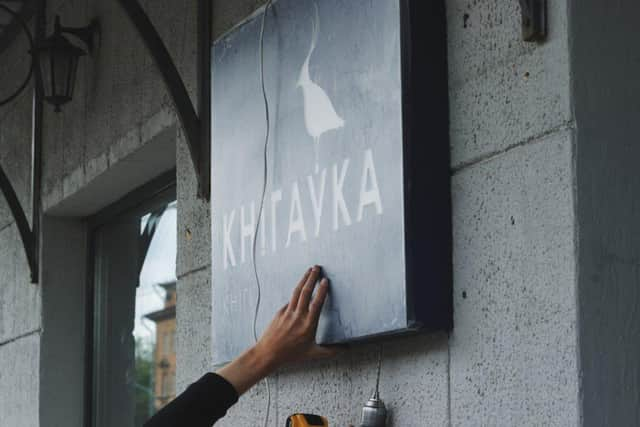Ukraine-Russia: Why books in Ukrainian and Belarusian are being targeted by pro-Russian forces
Now it has been claimed books published in Ukrainian and Belarusian languages are becoming a target of pro-Russian forces in the countries.
in Ukraine, authorities said Russian invaders were “deliberately” destroying all literature in the Ukrainian language as they raided towns and villages.
Advertisement
Hide AdAdvertisement
Hide AdMeanwhile, in Belarusian capital, Minsk, a new bookshop set up by a Belarusian language publishing house was raided on Monday – its first day of opening - amid claims it was selling “Nazi” literature, according to the Belarusian government’s Main Directorate for Combating Organised Crime and Corruption (GUBAZIK).


Andrey Yanushkevich, owner of Knihauka, as well as employee Nasta Karnatskaya, was detained and 200 books were seized. Mr Yanushkevich has been sentenced to ten days in prison.
The Kremlin has claimed Russian speakers in Ukraine have suffered discrimination and persecution under the government led by president Volodymyr Zelensky – an accusation that Ukraine has long denied. Many citizens in the east of Ukraine, where Russian is more common, have said they use Russian and Ukrainian interchangeably in their every day lives and have not faced any problems.
The narrative of Nazi factions operating in Ukraine has been one long used by Russian president Vladimir Putin as justification for invading the country.
In an online broadcast, a Ukrainian MP warned Russian soldiers were looting houses and destroying books and literature in the Ukrainian language.
“We have dozens of testimonies that all literature in the Ukrainian language is being deliberately destroyed,” said Nikita Poturaev, chairman of the Committee on Humanitarian and Information Policy, in a briefing on ‘Countering Russian propaganda’.
"That is, while they are there, they destroy everything – text books, children's books, fiction and non-fiction. If they see the Ukrainian language, the Ukrainian characters, they destroy them, as the Nazis behaved.
"The Russian military is deliberately destroying all literature in the Ukrainian language in some of our settlements.”
Advertisement
Hide AdAdvertisement
Hide AdIn Minsk, it is believed two TV journalists who support pro-Russian dictator Alexander Lukashenko had come to the bookshop and criticised the content of the books, before the authorities turned up.
The store, which trailed its opening with news that it would sell a Belarusian language version of Harry Potter and the Philosopher’s Stone by Edinburgh author JK Rowling, was opened by Belarusian publishing house Janushkevich, which was evicted from its Minsk offices in March without reason.
Belarus, which has Russian troops stationed along its border with Ukraine, is one of Russia's only allies. Earlier this week, Mr Lukashenko spoke at a meeting with Mr Putin and leaders of Armenia, Kazakhstan, Kyrgyzstan and Tajikistan to call for the countries – known as the Collective Security Treaty Organisation – to unite against the West.
Exiled opposition leader of Belarus, Sviatlana Tsikhanouskaya, said: “Books are an important part of preserving our history and culture. In Belarus, even bookstores are repressed by the regime and writers are targeted. The new Knihauka bookstore in Minsk was searched by security forces on the first day, but our culture is strong and will not be erased.”
Ms Tsikhanouskaya was widely believed to have won the majority of the last election in Belarus in August 2020. However, she was forced to flee the country immediately after the election, with Mr Lukashenko, an ally of Mr Putin who has led Belarus since 1994, remaining in power.
Belarusian and Russian are both considered official languages of Belarus, but only around a quarter of the nine million population speaks the former, whereas more than 70 per cent per cent speaks the latter. No more than one in ten Belarusians say they communicate in Belarusian in their day-to-day lives.
A resurgence of interest in Belarusian has taken place in recent years – a cultural movement that Russia is likely to want to quell. In the later part of the past decade, crowdfunding was set up to enable the publication of Belarusian-language books and the translation of films into Belarusian. Inscriptions on the shirts of Belarusian football players were beginning to increasingly appear in Belarusian.
However, the number of children taught in the language has dropped from around 19 per cent in 2010 to 13 per cent in 2018, as the education system leans towards the Russian influence. The figure is a huge reduction from the 75 per cent of children who studied in Belarusian in 1994-95, before Mr Lukashenko – who saw the main threat to his power in the Belarusian-speaking opposition – came into power.
Advertisement
Hide AdAdvertisement
Hide AdSome Belarusian parents have said they have intentionally taught their child to speak Russian as they learn to talk, rather than Belarusian, amid fears of a future Russian occupation of the country – and potential consequences for Belarusian speakers.
Other languages from former Soviet countries have also faced increased recent pressure from the Belarusian authorities.
Last month, the Minsk government ordered Lithuanian schools in Belarus to stop teaching in the Lithuanian language and instead teach children only in Russian or Belarusian from the next academic year. There are two Lithuanian schools in Belarus, situated in the cities of Pelesa and Rimdziuny.
Russia has made moves to impose Russian culture on areas where troops have occupied towns and villages, mainly in the east of Ukraine.
Last month, Russia imposed its currency, the ruble, on the occupied southern Ukrainian region of Kherson. Russian TV and radio has been broadcast in the city since the occupation began in March.
Reports out of Kherson have claimed Russians have begun to sell Russian products in the markets. Authorities have moved their own people into apartment blocks in the city, where they have been immediately appointed as block administrators – a role which gives them power over local residents.
Comments
Want to join the conversation? Please or to comment on this article.
